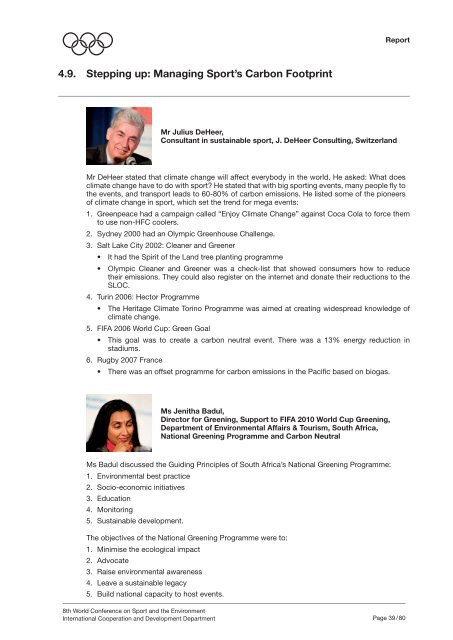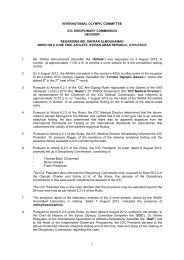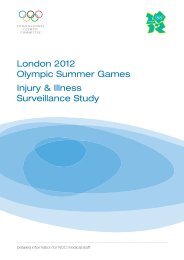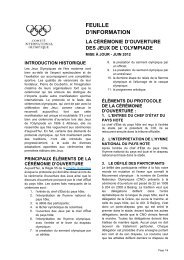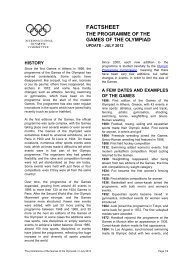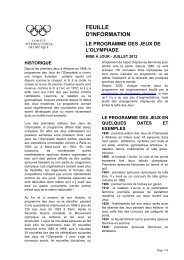8th WORLD CONFERENCE ON SPORT AND THE ENVIRONMENT
8th WORLD CONFERENCE ON SPORT AND THE ENVIRONMENT
8th WORLD CONFERENCE ON SPORT AND THE ENVIRONMENT
You also want an ePaper? Increase the reach of your titles
YUMPU automatically turns print PDFs into web optimized ePapers that Google loves.
4.9. Stepping up: Managing Sport’s Carbon Footprint<br />
<strong>8th</strong> World Conference on Sport and the Environment<br />
International Cooperation and Development Department<br />
Report<br />
Mr Julius DeHeer,<br />
Consultant in sustainable sport, J. DeHeer Consulting, Switzerland<br />
Mr DeHeer stated that climate change will affect everybody in the world. He asked: What does<br />
climate change have to do with sport? He stated that with big sporting events, many people fl y to<br />
the events, and transport leads to 60-80% of carbon emissions. He listed some of the pioneers<br />
of climate change in sport, which set the trend for mega events:<br />
1. Greenpeace had a campaign called “Enjoy Climate Change” against Coca Cola to force them<br />
to use non-HFC coolers.<br />
2. Sydney 2000 had an Olympic Greenhouse Challenge.<br />
3. Salt Lake City 2002: Cleaner and Greener<br />
It had the Spirit of the Land tree planting programme<br />
Olympic Cleaner and Greener was a check-list that showed consumers how to reduce<br />
their emissions. They could also register on the internet and donate their reductions to the<br />
SLOC.<br />
4. Turin 2006: Hector Programme<br />
The Heritage Climate Torino Programme was aimed at creating widespread knowledge of<br />
climate change.<br />
5. FIFA 2006 World Cup: Green Goal<br />
This goal was to create a carbon neutral event. There was a 13% energy reduction in<br />
stadiums.<br />
6. Rugby 2007 France<br />
There was an offset programme for carbon emissions in the Pacifi c based on biogas.<br />
Ms Jenitha Badul,<br />
Director for Greening, Support to FIFA 2010 World Cup Greening,<br />
Department of Environmental Affairs & Tourism, South Africa,<br />
National Greening Programme and Carbon Neutral<br />
Ms Badul discussed the Guiding Principles of South Africa’s National Greening Programme:<br />
1. Environmental best practice<br />
2. Socio-economic initiatives<br />
3. Education<br />
4. Monitoring<br />
5. Sustainable development.<br />
The objectives of the National Greening Programme were to:<br />
1. Minimise the ecological impact<br />
2. Advocate<br />
3. Raise environmental awareness<br />
4. Leave a sustainable legacy<br />
5. Build national capacity to host events.<br />
Page 39 / 80


